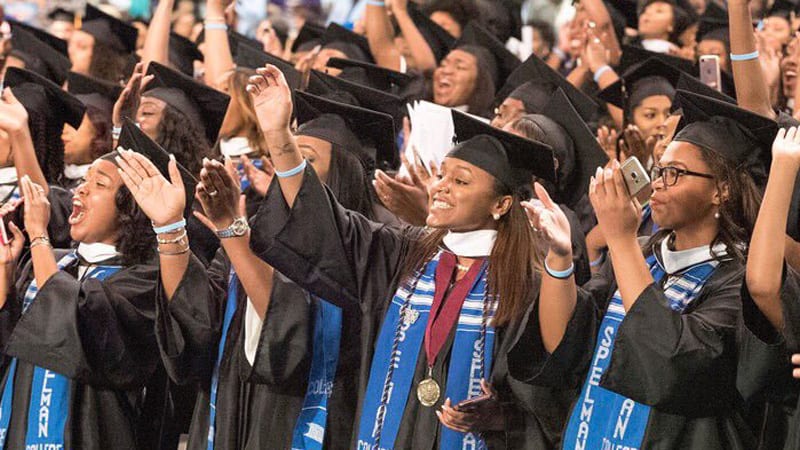A Once-in-a-Generation Outcome: The FUTURE Act Signed by President, Becomes Law

Today, President Donald J. Trump signed H.R. 5363, the FUTURE Act, into law. This landmark legislation permanently extends mandatory funding for Historically Black Colleges and Universities (HBCUs), Tribal Colleges and Universities (TCUs), Hispanic-Serving Institutions (HSIs) and other Minority-Serving Institutions (MSIs) to increase their science, technology, engineering and mathematics (STEM) outcomes, among other things. The law also eases the burdens on low-income, first generation college students by simplifying the process for applying for student financial aid.
“The FUTURE Act was UNCF’s, and the HBCU community’s, number one priority,” said UNCF President and CEO Dr. Michael L. Lomax. “We attained our goal because we had powerful bipartisan support at every point in the legislative process. We enlisted more than 20,000 supporters to write and call their Members of Congress. This activated army of advocates became the frontline of support for HBCUs, and they won the battle for our institutions and other MSIs. Now, HBCUs and MSIs can continue their important work of educating our next generation of STEM scholars. We thank the President for signing this extremely essential bill into law.”
“The last time a law like this passed and was signed in this manner was 19 years ago this month,” said UNCF Senior Vice President for Public Policy and Government Affairs Lodriguez Murray. “Standalone bills like the FUTURE Act that focus solely on minority populations and have a substantial benefit to HBCUs rarely pass Congress like this. They usually become part of larger, must-pass pieces of legislation; however, the FUTURE Act stood on its own two feet. The Minority Health and Health Disparities Research and Education Act of 2000, Public Law 106-525, was the last bill to become law like the FUTURE Act. This is a once-a-generation occurrence, and UNCF couldn’t be prouder to make a difference for HBCUs and our students.”
“We are also grateful for the broad support in the House and Senate, including the bipartisan HBCU Caucus and the Congressional Black Caucus,” Murray continued. “We thank the co-sponsors of the original legislation: Rep. Alma Adams, Rep. Mark Walker, Sen. Doug Jones, and Sen. Tim Scott. We also thank the senators who introduced the compromise to extend mandatory funding for HBCUs permanently: Senate Education Chairman Lamar Alexander, Senate Education Ranking Member Patty Murray, Sen. Tim Scott, Sen. Chris Coons, Sen. Richard Burr, and, again, Sen. Jones. In addition, we would like to thank all Members of Congress who helped us achieve this feat, such as Speaker Nancy Pelosi, House Majority Whip James Clyburn, House Education Chairman Bobby Scott, and Rep. Dusty Johnson. And, we thank President Trump for his signature and support.”
UNCF pursued the FUTURE Act with a first-of-its-kind digital platform (www.UNCF.org/protectingourfuture) and the “Protecting Our FUTURE” campaign. The result was a groundswell of public support resulting in 62,000 letters and 3,000 phone calls to Members of Congress to pass H.R. 5363. Joining that effort was much of the higher education community, including the following organizations:
- Achieving the Dream, Inc.
- ACPA-College Student Educators International
- American Association of Colleges of Nursing
- American Association of Collegiate Registrars and Admissions Officers
- American Association of Community Colleges
- American Association of State Colleges and Universities
- American Association of University Professors
- American Council on Education
- American Dental Education Association
- American Indian Higher Education Consortium
- Association of American Universities
- Association of American Colleges and Universities
- Association of Catholic Colleges and Universities
- Association of Governing Boards of Universities and Colleges
- Association of Jesuit Colleges and Universities
- Association of Public and Land-grant Universities
- College and University Professional Association for Human Resources
- Common App
- Consortium of Universities of the Washington Metropolitan Area
- Council for Advancement and Support of Education
- Council for Higher Education Accreditation
- Council for Opportunity in Education
- Council of Graduate Schools
- Council of Independent Colleges
- Council on Social Work Education
- EDUCAUSE
- ETS
- Hispanic Association of Colleges and Universities
- NAFSA: Association of International Educators
- NASPA-Student Affairs Administrators in Higher Education
- National Association for College Admission Counseling
- National Association for Equal Opportunity in Higher Education
- National Association of College and University Business Officers
- National Association of Colleges and Employers
- National Association of Independent Colleges and Universities
- National Association of Student Financial Aid Administrators
- National Council for Community and Education Partnerships
- Phi Beta Kappa Society
- The College Board
- TMCF
- UNCF
- UPCEA